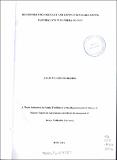Household Food Security and Coping Strategies among Pastoralist in Mandera County

View/
Date
2016-06Author
Mohamed, Abass Maalim
Type
ThesisLanguage
enMetadata
Show full item recordAbstract
This study focuses on causes of household food insecurity and coping strategies among households in Mandera County which has the highest percentage of food insecure households in Kenya. The study looks at the causes of food insecurity and analyzes government policy interventions carried out to address the problem. The study employed descriptive survey design. Both primary and secondary data were employed in this study. The population in this study consisted of all 128,125 households in Mandera County. From this population a sample of only three hundred and ninety eight (398) households were surveyed. Stratified and systematic sampling was used to get the sample. Questionnaires and interview schedules were the main instruments used in data collection. Pilot test was done in Wajir County. The enumerators together with the researcher moved from a household to another in data collection. The County Agricultural Extension Officers together with other front line extension staff acted as key informants for the study. Besides the primary data which was collected from the households, general information about food security was assessed in the intensive focus group discussions. Data from the completed instruments was coded and entered into the computer using SPSS software for analysis. The findings of this study show that various and interrelated factors are responsible for the problem of chronic household food insecurity in Mandera County. The study concluded that the households use various ways to cope with food insecurity especially the time of drought. They have various ways of coping with pasture shortages which include; strategic movements in search of fodder and water, various herd management strategies such as herd splitting, herd diversification and herd maximization to ensure that they spread the risk of livestock loss from droughts, diseases and theft. Opportunities for utilization of non-livestock rangeland resources which are used by the households included: medicinal plants, sand harvesting and cultivating fodder. Other types of coping strategies included social networks, reciprocity, neighborhood associations, stock associates, bond friendships and pooling resources together. Few households in Mandera County also mix their species to mitigate the effects of draught. The study also found that there are various socio-economical factors affecting food security in Mandera. These included education level of the household head, off farm income, dependants in a household, membership in the existing groups, extension services and infrastructure. The study also found out that there are various socio-cultural factors affecting food security in Mandera County which included traditions, reasons for keeping animals, relative values, responsibility and social obligations and traditional ceremonies. Based on the study's results the following interventions are recommended: Rangeland resource utilization and development, water source development and management, extension and institutional capacity building, capacity building for livestock producers and marketing associations, improvement of animal health/veterinary services, interventions for improving infrastructure for livestock disease control and marketing, adopting to climate change and enhancing early warning systems and exploitation and development of non-livestock resources.
Publisher
KeMU
